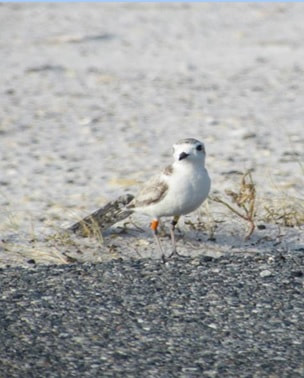 Snowy plover on the road's edge at Gulf Islands National Seashore, Florida
Snowy plover on the road's edge at Gulf Islands National Seashore, Florida
 Snowy plover on the road's edge at Gulf Islands National Seashore, Florida Snowy plover on the road's edge at Gulf Islands National Seashore, Florida Wildlife road mortality is a highly challenging issue for conservation, because roads are ubiquitous and the threat of vehicle strikes may not be factored into animals' habitat selection decisions. As such, roads may turn otherwise attractive habitat into ecological traps, where survival or reproduction are below levels that a local population needs to be sustainable. Estimating the numbers of animals killed by vehicle strikes in a locale is not as straightforward as it seems, because carcasses may disappear from roadways due to scavenging and decomposition faster than observers can count them. Additionally, observers may miss carcasses during surveys. Both problem lead to counts that are biased below true abundance. Statistical models to estimate abundance that rely on marking carcasses so that persistence rates and detection rates can be corrected for have been developed. They have traditionally relied on having at least 2 cooperating observers, one that initially marks the carcasses, and another that tries to relocate marked carcasses so that detection rate can be determined. In some instances, resource availability may limit the number of personnel available for carcass surveys. A new paper in the Journal of Wildlife Management authored by Maureen Durkin details a new method for estimating carcass abundance in the road when only a single observer is available, that relies on conducting two transects per survey day in close succession. Maureen's research focused on wildlife mortality at Gulf Islands National Seashore in Florida, where a paved road runs throughout habitat used by a variety of species including nesting shorebirds and seabirds. Her work demonstrated that all manner of taxa were affected by road mortality, including the Snowy Plover, a shorebird that is considered threatened in the state. She also showed conclusively that opportunistic road surveys miss large proportions of carcasses, and will serve to help make road mortality surveys more efficient and effective.
Comments are closed.
|
Categories
All
Archives
July 2019
|
 RSS Feed
RSS Feed
